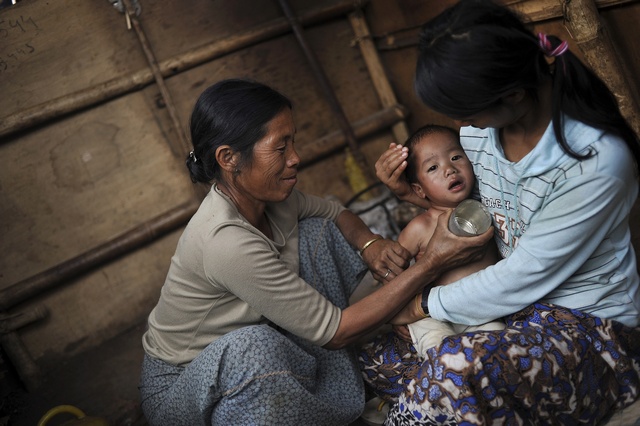The Burmese government continues to systematically violate human rights throughout the country, despite taking significant steps towards political reform over the last year, a new report by Human Rights Watch (HRW) has warned.
The rights group commended the former pariah state for releasing political prisoners, easing media restrictions and allowing opposition parties, including Aung San Suu Kyi’s National League for Democracy, to engage in the political process. But it scolded the regime for its persistent failure to end army abuses against civilians in Kachin and Arakan states, as well as the ongoing persecution of environmental and democracy activists.
“No one expects that a rights-respecting democracy will arrive overnight, but Burma is still failing basic rights tests on its remaining political prisoners, blocked humanitarian aid, and ensuring accountability for war crimes,” said Phil Robertson, deputy Asia director for HRW.
Research suggests that over 200 political prisoners remain incarcerated in Burma, while the government continues to arrest and convict activists using legislation introduced under the former military regime. Robertson further accused the international community of hindering the reform process by playing a “cheerleading” role through “oversell and hasty praise” in the face of ongoing human rights violations.
“The international community has to get over its elation that Burma is opening up and recognise that this is going to be a long, tough slog with the possibility for progress but also setbacks,” he told DVB in an interview. “There are parts of the government that are not necessarily on board with the reforms and don’t understand what human rights are and why government officials should be held accountable when they violate them.”
President Thein Sein has been credited for introducing sweeping democratic reforms in Burma, since taking power from the military junta in March 2011. But serious concerns remain over his failure to rein in the army, which ruled the country with an iron fist for nearly five decades.
The military retains a firm role in public affairs, including 25 percent of seats in parliament, and are constitutionally guaranteed immunity from abuses perpetrated under the former regime.
During last year’s sectarian violence in western Burma, security forces were accused of systematically targeting the stateless Muslim Rohingya minority, who are considered illegal immigrants by the government and denied basic rights.
The government’s escalating offensive against the Kachin minority in northern Burma, where rebels are fighting for greater autonomy and ethnic rights, has also prompted international condemnation for its devastating impact on local communities. Analysts say it also undermines the regime’s credibility with Burma’s other ethnic armed groups, all of whom have inked tentative ceasefire deals with the government.
A report by the humanitarian group, the Free Burma Rangers (FBR), on Thursday said the army is “taking advantage” of the ceasefire deal signed with the Karen National Union last year by securing military control over their territories in eastern Burma. The FBR accused the army of developing a network of roads and military camps in an effort to “compartmentalise and isolate ethnic communities.”
“One of the big concerns is that when we talk about the reform process in Burma we are just not seeing much reform within the military,” said Robertson. “The military still targets civilians, sexually abuses women and girls, so that raises the issues of are we getting reforms that will penetrate all bodies of government or are we just seeing Rangoon-based reform?”
The international community, including the United States, has eagerly welcomed Burma’s democratic transition and rapidly shed most of the economic and political sanctions formerly imposed on the regime. The US administration has been described as keen to counter-balance the influence of China in Burma as part of its “pivot to Asia” strategy. But it has raised alarm among activists, who worry that ongoing abuses may be overlooked.
Earlier this week, a coalition of campaigners criticised the decision by a leading group of western countries, known as the Paris Club, to drop $USD5.9 billion of Burma’s debt as “premature”.
“It is incredible that Burma gets billions of dollars of debt relief when its biggest spending is on the military, an army that is committing crimes against humanity in its war against ethnic minorities,” said Anna Roberts from Burma Campaign UK.



